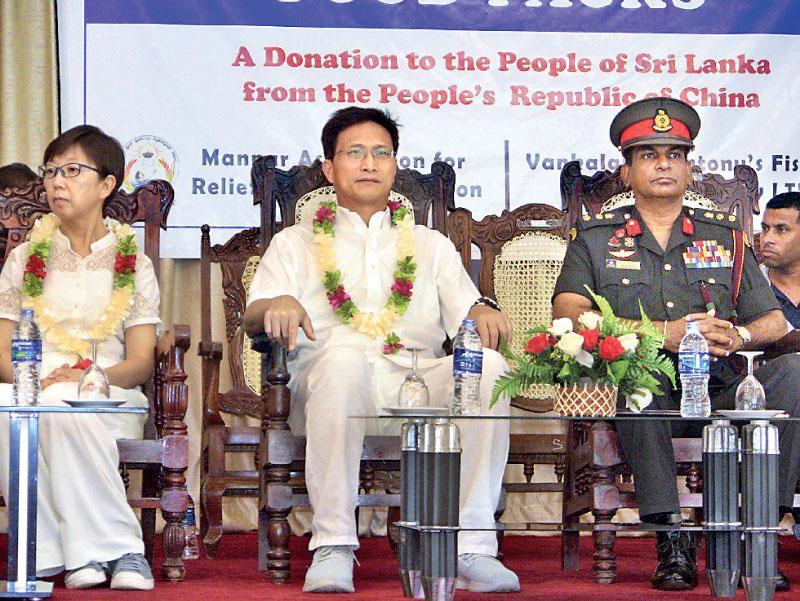Can China win over Northern Tamils?
By M S M Ayub

Ambassador Qi Zhenhong in Mannar: Have Chinese leaders failed to read the minds of the Tamils
He stated that the dry ration parcels were a donation to the northern people by the Buddhist temples and the Buddhist people in China under the China-Sri Lanka Buddhist Corporation Programme
The priority given to events by the Sri Lankan Tamil media in most cases is different from what is given by the Sinhala and English media.
Despite the Colombo-centered news that dominate the Sinhala and English media getting somewhat space in Tamil media as well, certain events sometimes get exclusive priority from the latter.
Some struggles by Tamil people in the Northern Province for the lands that have been occupied by the armed forces continued for more than a year, making continuous headlines in Tamil newspapers without being noticed by the Sinhala and English media.
Similarly, the demonstrations and sit-in protests by the Tamil people in the north over the PTA detainees languishing in prisons for years and decades or people who disappeared during the war occasionally capture considerable time and space only in Tamil media.
While Sinhala and English media are currently dominated by the events and statements on the cricket crisis, budget proposals presented by President Ranil Wickremesinghe on Monday and demonstrations by various trade unions demanding relief in the face of the current economic crisis, Tamil media recently had two additional and exclusive issues to discuss with their audience.
One was a controversy that sprang out from a statement made by TNA Parliamentarian M.A. Sumanthiran that the leader of his party, the nonagenarian R. Sampanthan must retire from Parliament due to his ill health and age. The other one was an issue rekindled by the Chinese Ambassador in Sri Lanka Qi Zhenhong during his latest visit to the Northern Province.
An earlier visit by the Chinese Ambassador to the north in December 2021 created more controversy as Sri Lanka had withdrawn an agreement to offer three renewable energy projects in three islands off the Jaffna Peninsula to China just prior to the Chinese Ambassador’s visit as a result of concerns expressed by the Tamil leaders and especially by India. Besides, the Ambassador had gone on a boat ride up to a point very close to the maritime border of India.
This time the Ambassador visited Vavuniya on November 5 where he attended a meeting at the District Secretariat during which 500 dry ration parcels – each valued at Rs 7,500 – were distributed among low-income families in the north.
Ambassador Qi Zhenhong, according to Tamil media told the gathering that his government has allocated Rs 155 million for these dry ration parcels along with a housing project and fishing nets for the fishermen in the province.
He then visited Jaffna and attended religious events at the famous Nallur Kandaswamy Temple, before visiting Mannar.
He stated that the dry ration parcels were a donation to the northern people by the Buddhist temples and the Buddhist people in China under the China-Sri Lanka Buddhist Corporation Programme.
However, as happened in 2021, the visit this time also earned only a negative response from Tamil politicians. Major political parties seemed to have ignored the events. Media spokesman of the Democratic Militants Party, a party formed by the former cadres of the Liberation Tigers of Tamil Eelam (LTTE) had warned that a strong foothold by China in the north would be harmful to the Tamils of the north and the very survival of Tamils would be in jeopardy in the event of a power struggle between India and China in the Palk Strait.
He observed that the Dravidians on either side of the Palk Strait – Tamil in Northern Sri Lanka and two Dravidian communities in Tamil Nadu and Kerala – would be a guarantee for India’s national security. The exaggerated alarm apart, his statement is a clear indication of the northern psyche on the Chinese approach towards them.
Since India is considered the second homeland by many Tamils in Sri Lanka, winning the hearts and minds of the Tamil people in Sri Lanka seems to be a gigantic task for China.
China has a long way to go in that direction, given certain historical, cultural, political and even psychological realities involving the relationship between India Sri Lankan Tamil people. These realities are based on the geographical and linguistic proximity between northern Sri Lanka and the southernmost State of India which is a static factor.
The Mahatma Gandhi statues in many Tamil-dominated areas in Sri Lanka attest to the cultural link between the Sri Lankan Tamils and India.
During the Sino-Indian war in the 1960s and the three wars between India and Pakistan, Sri Lankan Tamils and Tamil media sided with India. Besides, the Tamil Nadu media, especially the electronic media and, more importantly, the television channels owned by the Tamil Nadu politicians make a tremendous psychological and political impact on Sri Lankan Tamils.
Tamils in Sri Lanka, except for a small group only for a short period, never replaced India with China in their minds. A small group of Sinhalese and Tamils who were attached to the Ceylon Communist Party preferred China over India, an ally of the Soviet Union, after the Sino-Soviet conflict in 1961.
They formed the Ceylon Communist Party (Peking Wing) under the leadership of Nagalingam Shanmugathasan while holding critical views towards India. The group did not thrive for long and soon vanished from Sri Lankan politics.
The three-decade-long war between the Armed forces and the LTTE played a decisive role in shaping the current Sri Lankan Tamil psyche as well.
In spite of India having supported the government’s war efforts subtly, it always stood for the rights of Tamils on the island. What the Tamils have achieved for the past seven decades in their search for a political solution to the national question has only been the provincial council system of 1987, a result of much arm-twisting by India against the Sri Lankan government.
Despite India’s stance towards her southern neighbour having mellowed and changed following the end of the Cold War in the 1990s, Tamil leaders, still bank on India’s diplomacy in their quest for greater devolution of power. China has been a total outsider in this regard.
After the war ended in May 2009 Tamils’ quest turned from one for a separate state to one for justice for the victims of the war and the struggle was also shifted accordingly from jungles in Vanni to Geneva.
They have been seeking assistance from the international players at the United Nations Human Rights Council (UNHRC) to penalise political and military leaders for the sufferings they underwent and the loss of life and property during the war.
While India managed to strike a balance between the Sri Lankan Government’s position and the Tamil demands, China has been wholeheartedly supporting the government’s position.
The historical, linguistic and cultural factors apart, the roles played by Beijing and New Delhi, especially concerning the separatist war and the question of Human Rights violations have ruled out at least for the moment the possibility of the former replacing the latter in the hearts of Tamils.
Besides, the statement that the dry ration parcels are from the Buddhists in China indicates that the Chinese leaders have failed to properly read the minds of the Tamils.



